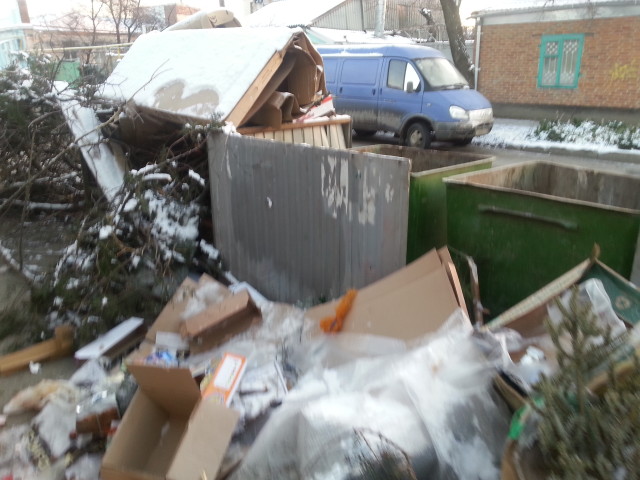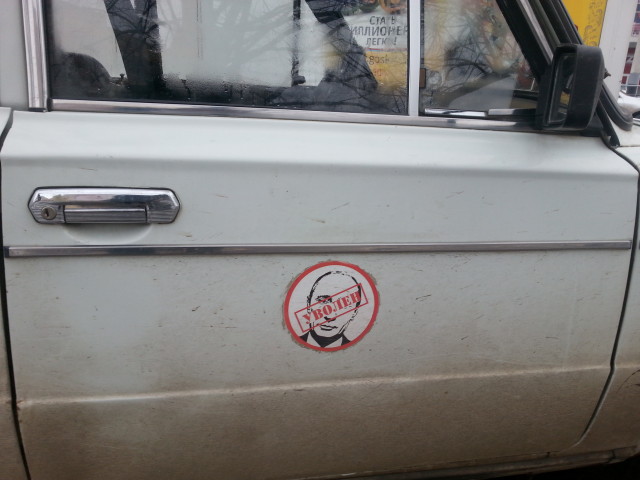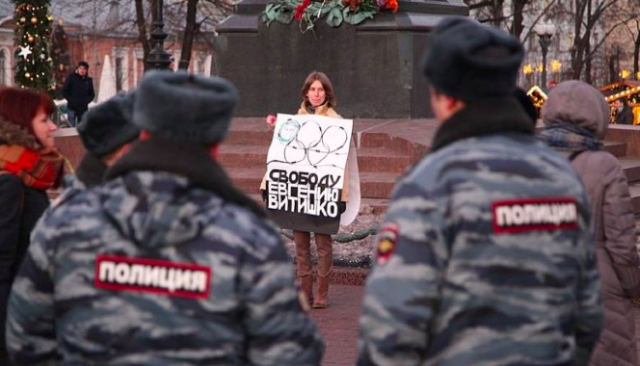
Arctic Frontiers: Disinformation, Security and the Northern Sea Route
Bellona held a seminar on countering Russian disinformation in the Arctic at the Arctic Frontiers international conference in Norway
News

Publish date: January 25, 2014
News
KRASNODAR, Russia – If the Kremlin has sent some 60,000 police officers and security forces into Russia’s Krasnodar region under the pretense of thwarting terrorist attacks on the Olympics, set to begin on February 7, their mandate prior to the games must be focused on harassing environmental activists.
Upon arriving here in this Northern Caucasus city yesterday, my hosts and I have been stopped by traffic police, held up for street interrogations, my hotel room was visited by persons unknown in my absence, who left a clumsy calling card – a bug inserted in the television remote control, which I might otherwise have missed had they not forgotten to snap the battery cover back into place.
The police and secret services presence is so huge that, according to a tally by the Washington Post, the Kremlin has put some 26 security personnel in place per each expected Olympic athlete – an impressive ratio, but one that seems typically over the top in that heavy handed Kremlin way.
Yes, there is the danger of terrorism, as the 34 who died as the result of suicide bombers in Volgograd last month show. But then there is the question of stupidity versus hubris. Given Sochi’s proximity to restive Caucasus regions such as Chechnya and Dagestan, what the hell was the government expecting?
Post columnist Sally Jenkins turns this question to the International Olympic Committee and points out correctly its history of ineptness and itchy palms.
But my initial impression of the overwhelming security presence is that it is serving a dual purpose – both the stated Kremlin promise to keep athletes and 200,000 expected spectators safe from the enemies Moscow itself has made in the region, and, as importantly, to keep the victims of the Olympic drive from complaining too loudly. And even beyond the societies of social activists and environmentalists, there are plenty of people here who have plenty of Olympic related woes on their mind. But few of them are especially forthcoming. It’s all just another disaster to be survived, another turn of Kremlin gears they hope not to get crushed by, only sprained. As one activist here told me, “It’s just something called life in Russia.”
According to my acquaintance Dmitry Shevchenko, who heads up the local offices of the Environmental Watch on the North Caucasus (EWNC), the storm of police, secret agents, general surveillance and paranoia that has intensified since January 7, was followed by yet another storm a week ago, a gouging cold front of raining ice that felled trees and power lines, scattered tree boughs and cutting off electricity to much of the city.

It was a complete surprise for this area, where the temperature this time of year usually hovers around plus 10 Celsius and an occasional dusting of snow is something to remember. Shevchenko ironically noted that the Olympics seem to have made the Krasnodar Region the butt of two kinds of climate change: meteorological and social.
Local broadcasts on Rossiya 1 television, the official state channel with the exclusive rights to the Olympics, are calling for volunteers to wade into the snarl of trees and electrical lines to help bring order to the streets and sidewalks. Krasnodar’s own municipal workers have long been absent, drafted into service to polish Sochi.
The neglect of Krasnodar is evident everywhere as spidering birch branches tangle with ripped blue garbage bags and household waste in piles occluding traffic.
It was next to such a pile that yesterday, Viktor Chirikov, an associate of EWNC, was pulled over by traffic police with Shevchenko and myself in tow.
For the sake of full disclosure, Viktor’s car, a rickety Lada of about late 1980s vintage, is also a rolling anti-Vladimir Putin advertisement. The words “Putin, Get Out” – recalling Pussy Riot’s punk hymn – are written in huge bold letters across its back window. Pictures of Putin’s face are stenciled on both Viktor’s driver and passenger doors, with the word “fired” stamped across the Russian president’s face.
And above one of these lampooning caricatures of Russia’s Olympic God sat me and my recognizably foreign face, which was spotted by the beat cops at the airport and let loose a flurry of whispering chats on walkie-talkies as I awaited Viktor and Dmitry’s arrival.
In short, there was no way that car was not getting pulled over. But the reasons for the stop, as explained by the fresh faced, almost cheerful cop wearing a clean Kevlar vest that seemed to almost smell of starch, were that Viktor’s car was a “vehicle of interest” for its resemblance to one involved in some week-old crime.
The explanation was laughable. “My car has been ‘a vehicle of interest’ at least three times this week,” said Viktor, a giant avuncular lumberjack of a man who has over the past several months learned to take in stride that any trip to so much as the grocery store could last three or four hours while he haggles with traffic police who haggle back, demanding more and more documents and grill him about where he is going and where he has been.

“I have been wondering forever who would be stupid enough to have a car that looks like mine and go out and commit a crime,” he said, laughing away the darker, obvious implications of the stop: He’s driving around with EWNC’s acting director and a foreign journalist in a land where anything negative said about the Olympics and the environmental devastation, staggering corruption and human rights abuses it has unleashed are tantamount to Orwellian thought crime.
And what, exactly, is the threat that EWNC poses?
In the days before the Olympics open, the group, as loose a confederation as it now is, is scrambling to publish its detailed compendium of environmental abuses and destruction caused by the Sochi Olympic push. They’re also scrambling for a place to publish it, and with more conventional avenues for doing so pretty much closed, Shevchenko says the end result will likely be a downloadable PDF released on the group’s website, which he hopes will gain traction.
He’s not the type to show work in progress, though much of the destruction that’s taken place has already been revealed thanks to EWNC.
But judging from the care he takes to look over his shoulder when he walks down the street, you get the impression that there is something more in the pages, something pointing to a wholesale condemnation of Putin’s vanity project and the undeclared war he has opened on the entire Krasnodar Region. Some evidence of the Kremlin’s absolute disregard for the country it represents. Something so ugly that it will stick, and hobble Putin’s catlike agility in dodging international criticism for good.
In the evenings, the EWNC office in Krasnodar serves as a hangout, both for the hardcore activists, and those who just sort of pass through and take part where they can. For a coterie that eschews the uses of telephones – they’re all bugged anyway – and which is extremely sensitive about sharing its location, the traffic of those who are privileged with that knowledge is heavy. The conversation was surprisingly light for a group that knows its days are numbered. Last night, discussion over order-in pizza drifted from recounting discoveries of further environmental degradation to breaking down the out of control situation in Ukraine.
The only reminders that a larger cloud hovered over the gathering was when each new visitor commented on the FSB model car idling in a parking space in front of the building.
It’s as if what was happening to both those present and those who were unable to be here bore no further discussion. The group is being ripped to shreds by Russia’s “foreign agent” NGO law and, according to Shevchenko, it will no longer exist – at least in its current form – once the Olympic torch is extinguished on February 23.
Last year’s legislation requiring NGOs that receive foreign funding and engage in political activity to register as foreign agents or be fined or shut down hit EWNC particularly hard when the group tried to move its registration from Sochi to the tiny neighboring republic of Adygea. Shevchenko said that the group was told by officials such a move would violate EWNC’s territorial charter – a bureaucratic wrinkle in any other region, but one that, owing to the friction between the group and the Krasnodar Region’s authoritarian governor, Alexander Tkachev, hit EWNC with the force of a wrecking ball.
Andrei Rudomakha, a coordinator with EWNC is also here. But then again, he is always here. He’s not allowed to leave town by the authorities, pending a trial for allegedly defaming a judge in writing. His telephone is bugged and he’s followed constantly.
He’s also the kind of guy that you’d say lives at the office, if that were not literally the case. When the evening winds down, Andrei retires to a yoga mat in a walk in closet. Ironically, the local Yabloko party, with which Rudomakha has close connections, has confessed to penning the words Rudomakha is accused of writing. This revelation, however, has had no effect, however, and Rudomakha could easily end up in jail.
Suren Gazaryan, is also present in his absence, after having to flee to Estonia last year over a matter concerning Tkachev and, further, a clash with guards surrounding the pier in the Black Sea’s protected waters that serves a giant mansion Putin has built for himself with $1 billion in putatively embezzled funds.
Gazaryan was initially convicted with another group member, Yevgeny Vitishko, in 2012 of destruction of property for spray painting on a construction fence surrounding another crony mansion built in protected forests for Tkachev.
Both were given three year suspended sentences. Shortly after that, Gazaryan paid a visit to Putin’s pier to inspect its environmental integrity – it has none – where he was told to leave by truncheon-wielding guards. Picking up a rock in self defense, Gazaryan was later told he would be brought up on attempted murder charges. That plus his suspended sentences spelled a long prison term, so he sought asylum in Tallinn.

On Friday night at EWNC, Vitishko was also present, but on a large computer screen via Skype, and imbued the gathering with his calm, friendly countenance. He’s not allowed to leave Tuapse, a coastal city about 150 kilometers south of Krasnodar. Last month, the same court in Tuapse that had given him and Gazaryan suspended sentences retried Vitishko and gave him an actual three-year custodial sentence. He and his lawyers are appealing it, and he is free until that court date on February 22 – timing Vitishko’s supporters say is meant to make his eventual conviction, which they consider a foregone conclusion, less visible as the Olympics wind down.
The irony, as Gazaryan told me early last month in Tallinn, is that neither he nor Vitishko actually know who sprayed “Tkachev is a Theif” on the construction fence. They were holding a protest rally of about 20 near the fence and according to Gazaryan, a couple of tag-alongs were responsible for the paint job.
When I asked Shevchenko why the authorities were taking such a minor offence so seriously, he told me that the cost of cleaning the fence of the offending words ended up causing more damage to the fence than the paint, hence making the whole debacle more expensive.
But there’s more to it than that. “Tkachev takes these kinds of things very personally, and also controls the courts.” Indeed, Tkachev has a lot of personal and political capital invested in the Olympics. Shevchenko says that this latest bid for the Olympics – which represents the third time Sochi has been put in the running – was the brainchild of Putin, Tkachev, and former finance minister Alexei Kudrin.
Yet, a three-year prison sentence for Vitishko and prolonged exile for Gazaryan is an absolutely ridiculous outcome for both. They are not a couple of errant youth thugs running around with spray paint cans and anarchically busting things up. Both are respected scientists – Gazaryan a zoologist and Vitishko a geologist.
Then again, perhaps that’s the point: They know what’s wrong, know how useless the environment is going to be in the wake of the world’s most expensive Olympics ever, and can state it with authority.
In that sense, Vitishko, Gazaryan, Rudomakha and the plight of EWNC represent as clear an example of persecuting and prosecuting innocent people as these Olympics have yet to offer.
This is the fourth in a series of articles on the Sochi Olympics by Bellona.

Bellona held a seminar on countering Russian disinformation in the Arctic at the Arctic Frontiers international conference in Norway

Our December Nuclear Digest, reported by Bellona’s Environmental Transparency Center, is out now. Here’s a quick taste of three nuclear issues arisin...

Bellona has launched the Oslofjord Kelp Park, a pilot kelp cultivation facility outside Slemmestad, about 30 kilometers southwest of Oslo, aimed at r...

Our November Nuclear Digest by Bellona’s Environmental Transparency Center is out now. Here’s a quick taste of just three nuclear issues arising in U...